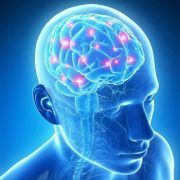Avoiding Information Overload to Cope with Stress and Anxiety During a Pandemic

Your brain is hard-wired to protect you from harm—especially in the face of real (or even imagined) stress. The initial response to a stressful situation provides a burst of energy to help you respond to the perceived threat. That’s partially why occasional stress and anxiety can help provide the motivation you need to tackle a big work project, study for a test, or start a new job.
Stress is caused by external stimuli (also called a trigger), while anxiety is part of the internal response to stress. And even though stress is an unavoidable part of life, humans aren’t well-equipped to endure prolonged periods of stress and anxiety. So, unmanaged stress or chronic anxiety can wreak havoc on emotions, memory, and overall health.
COVID-19—the disease caused by the novel coronavirus—and the information overload it has caused, has increased worldwide levels of stress and anxiety. The human brain is complex and provides the unique ability to imagine threats to your health, including how this virus could cause harm. The majority of people with COVID-19 recover and only experience mild-to-moderate symptoms—body aches, fever, and cough. But the uncertainty of how it will impact physical, financial, and social health (and that of loved ones) has led to unprecedented levels of stress and anxiety.
How Stress and Anxiety Work—A Refresher
Human ancestors needed the fight-or-flight response to survive their harsh world. When fearful or stressed, a rush of adrenalin prepared them to flee dangerous situations or fight to defend their ground and survive. In a modern society it’s rarely needed for actual survival.
Stress causes a chain reaction that begins in your protective brain. When you experience an event perceived as fearful, the amygdala—an almond-shaped mass located in each brain hemisphere—kicks into gear. This complex mass of cells helps regulate survival instincts (fight-or-flight responses), emotions, hormonal secretions, and memory.
Research suggests that the amygdala is also involved in the anxiety process. People with anxiety disorders are thought to have over-reactive amygdalae. The amygdalae are part of a larger network within the central nervous system that regulates the physiological effects of stress and anxiety.
The body’s stress response system is designed to engage when needed and disengage when the threat has passed. Feeling anxious and stressed is part of this temporary process to help keep us alert for signs of danger. But persistent stress and anxiety can become problematic and interfere with physical and mental health.
An ongoing global pandemic creates conditions for persistent stress. So, it’s important to understand how the COVID-19 crisis could potentially affect your mental and physical health and find ways to manage the stress and anxiety you’re feeling.
How Information Overload Contributes to Stress and Anxiety
The world has evolved from just using the internet for work or school. Now it’s a conduit for entertainment, a way to meet and connect with people, and an outlet for world-wide news. And it’s all at your fingertips, 24 hours a day.
For many, a good morning routine starts with reading a newspaper, scrolling through social media posts and news feeds, watching the news, or listening to the radio. But is this a healthy way to start the day?
A 2014 survey conducted by National Public Radio (NPR), the Robert Wood Johnson Foundation, and the Harvard School of Public Health found that 40 percent of those surveyed reported feeling stressed during the previous month. These respondents also mentioned reading or hearing news reports as a contributing factor.
Most people haven’t lived through a global pandemic as deadly as COVID-19. Almost everyone’s way of life has abruptly changed due to a tiny little virus—not visible to the human eye—that has caused a global health and financial crisis. And it’s made many fearful of the unknown.
The modern, 24-hour news cycle provides a continuous flow of rapidly evolving information from around the globe. News about COVID-19 is everywhere and not limited to credible information sources. Blogs, websites, and social media accounts are filled with opinions and information that may or may not be accurate.
This relentless flood of information makes it difficult to distinguish between what’s reliable and useful, sensationalized, full of half-truths, or blatantly false. When you factor in the mandated social distancing that keeps loved ones apart, financial struggles, and the fear of the unknown, it’s no wonder that people feel overwhelmed and powerless. And this contributes to more stress, anxiety, fatigue, and feelings of helplessness.
It’s normal to feel frightened and anxious in stressful situations that you can’t control. And the good news is there are aspects of life you can control and strategies you that can try to help you manage and alleviate stress and anxiety.
Stress is a cycle with many phases and symptoms. You can change the way you manage stress and that can help improve the way you feel. It’s important to pay attention to your physical and mental health, and recognize the signs and symptoms of stress in your loved ones. That way you’ll know when to seek help.
Identifying Signs of Stress
Everyone experiences occasional stress, but it’s the response to stress and anxiety that makes the difference. The symptoms of persistent, unmanaged psychological and physical stress are many. Here are a few noteworthy examples:
- An increase or decrease in activity or typical energy levels
- Difficulty sleeping or relaxing
- Rapid heartbeat
- Frequent headaches
- Gastrointestinal upset
- Changes in appetite
- Heightened alertness
- Feeling more irritable or angry
- Excessive worrying
- Feeling depressed or unusually sad
- Feeling tired
- Inability to have fun or experience pleasure
- Preferring to be alone
- Feeling anxious, fearful, or confused
- Difficulty making decisions and thinking clearly
- An increase or decrease in the use of alcohol, tobacco, or in the misuse of legal and illegal drugs
Long-term activation of your body’s stress-response system can increase the risk of developing serious health problems. That’s why it’s important to recognize the signs and symptoms of stress and take appropriate action to manage them before they spiral out of control.
Tips for Managing Information-Related Stress During COVID-19
You may not be able to control the world to remove stress, but it’s possible to change the way you respond to stress. And that can make all the difference in how you feel. Reducing stress often provides immediate relief and can provide long-term benefits for your health. Learning to cope with stressful situations now can even help make future ones easier to manage.
Like you read about above, information is important, but also can become overwhelming. Find a balance between staying informed about the COVID-19 outbreak while maintaining sanity and lower stress levels. Spending too much time watching and worrying can lead to increased levels of stress and anxiety.
Start by setting limits on how much time you spend online or watching the news. Also, identifying the “why” behind unhealthy media habits is the first step toward breaking the habit.
Don’t just limit your time stewing in the news of the day. Limit the sources of information to quality, credible outlets. Information can change rapidly as more is discovered about this virus. That’s why it’s vital to find accurate and trustworthy sources. Knowing the facts can help you protect you and your loved ones, and bring a sense of calm to help you mentally manage through trying times.
Good sources of for information about outbreaks from infectious diseases include:
- Your physician
- State or local health departments
- Government health agencies
- International health organizations (like the World Health Organization) are good sources
Take a Calming Deep Breath and Learn Strategies to Cope
Instead of disappearing down the rabbit hole of information overload, there are activities you can do and habits you can adopt to help fight the extra stress of the pandemic.
- Socialize, share, and safely see others: Most people are social. That’s why it’s been so difficult to quarantine or social distance from friends and family. Social support is a critical component of healthy relationships and resilient psychological health. Your network of family and friends play a key role in your daily life and you play a role in theirs. This emotional support system is there for you in times of stress to bolster you and help push through hard times.
Talk with family, friends, or loved ones who may be experiencing similar stress and anxiety. A study in the journal Behaviour Research and Therapy found that individuals who were able to successfully write or verbally express their stress-related feelings experienced significant improvements in their own physical health.
Connecting with others to share reliable information, express feelings, and voice concerns may help you develop healthy strategies to better cope during stressful times. If you can’t safely be with family and friends physically, find ways to connect virtually. FaceTime, ZOOM, Google Hangouts, and many other video chatting options are available for virtual visits. Or do it the old-fashioned way, through a phone call, a text, email, or letter—whatever works best. You could also consider joining an online coronavirus support group.
- Designate periods of time each day to unplug from devices: Turn off the TV, smart phones, and other connected devices. The information will still be there when you’re ready to reconnect.
- Schedule regular times to relax your body and mind: You have many options: Meditate, do yoga, breathe deeply, practice mindfulness, take a bath, read a book, enjoy a hobby, listen to soothing music, gently stretch, or go for a walk or run. Exercise is especially helpful to relieve built-up stress and reduce the accompanying muscle tension.
- Dose up on nature: Research shows that spending time outdoors relieves stress and lowers stress hormones. When you’re outside enjoying nature, blood pressure and heart rate decrease, mood improves, feelings of anxiety and stress diminish, and mental clarity improves. During the COVID-19 pandemic, enjoying the outdoors also provides a good way to socially distance.
- Focus on healthy choices: Making healthier choices to care for your body will have a positive impact on your overall health and well-being. Skip the fast food line and strive to prepare and eat regular, healthy meals with plenty of fruits, veggies, whole grains, and lean protein sources. And don’t forget to stay hydrated. Ensure you’re tucking in for the recommended amount of sleep (7-9 hours) each night. Also, wash your hands regularly.
If you just can’t seem to control the stress and anxiety you’re feeling, and it’s impacting your health and daily life, please seek help from a professional healthcare provider. A health professional can help bring clarity to what you may be feeling, and provide you additional coping tools.
Take Care of Yourself
Learning new ways to decompress and find stress-free moments in everyday life is important for long-term health anytime. But this is especially important during a global pandemic.
It’s understandable to feel anxious and worried about what’s happening in the world, and what could happen to many aspects of life. The most important thing to remember is to listen to what your body is telling you—know what you’re feeling inside—and give yourself what you need, when you need it. Strive to remain hopeful, celebrate successes even if they are small ones, express gratitude and love, and don’t be afraid to seek professional help if you need it.
References
https://www.cdc.gov/coronavirus/2019-nCoV/index.html
https://www.mentalfloss.com/article/92306/7-tips-staying-informed-without-experiencing-media-burnout
https://www.stress.org/how-the-brain-balances-feelings-of-stress-and-calm
https://www.nimh.nih.gov/health/publications/stress/index.shtml
https://www.stress.org/stress-effects
https://www.tuw.edu/health/how-stress-affects-the-brain/
https://www.mayoclinic.org/healthy-lifestyle/stress-management/in-depth/stress/art-20046037
https://www.health.harvard.edu/staying-healthy/understanding-the-stress-response
https://www.sciencedirect.com/science/article/abs/pii/0005796793901054
https://wexnermedical.osu.edu/blog/how-to-cope-with-coronavirus-stress
https://www.cdc.gov/coronavirus/2019-ncov/daily-life-coping/managing-stress-anxiety.html
https://health.clevelandclinic.org/7-strange-things-stress-can-body/
https://www.psychologytoday.com/us/blog/why-we-worry/201206/the-psychological-effects-tv-news
https://www.worldatlas.com/articles/10-ways-to-reduce-stress-during-a-pandemic.html
https://www.nytimes.com/2020/04/01/well/mind/coronavirus-stress-management-anxiety-psychology.html














